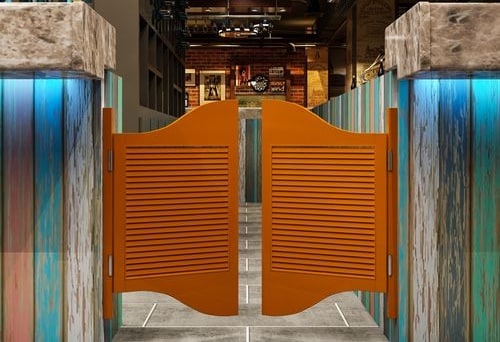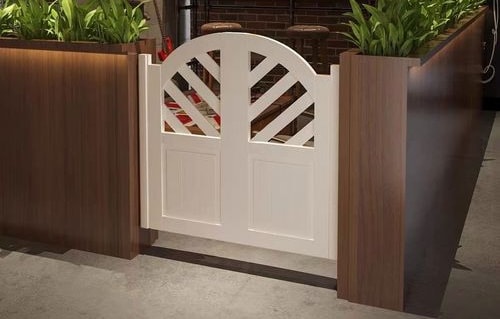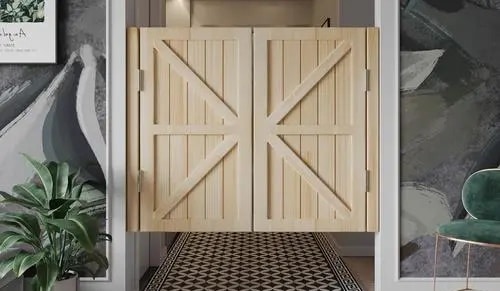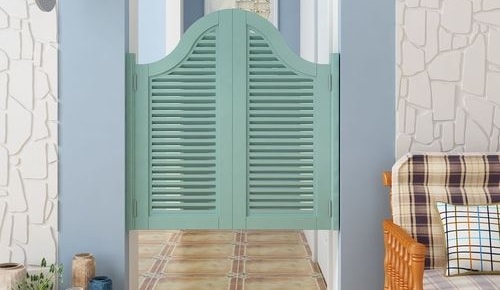What are saloon doors called?

Saloon doors, also commonly referred to as “batwing doors” or “café doors,” are a type of swinging door typically found in Western saloons or bars. They are characterized by their split design, where each half of the door is mounted on a hinge and swings independently, allowing people to pass through easily while providing some privacy and noise reduction. These doors were trendy in the Old West and are often featured in Western movies and TV shows.
What was the purpose of saloon doors?
Saloon or batwing doors served several purposes in Western saloons and bars. Some of the main reasons for using saloon doors include:

- Hinge placement: The hinges are mounted on the door frame, typically at the top and bottom of each door panel. These hinges are designed to enable the doors to swing both inwards and outwards, providing a smooth and easy passage.
- Bi-directional swinging: The hinges incorporate a pivot mechanism, which allows the doors to swing in either direction. This bi-directional swinging feature makes saloon doors unique compared to regular doors that only open in one order.
- Self-closing mechanism: Many saloon doors have a self-closing mechanism, such as a spring or gravity pivot hinge. This feature ensures that the doors return to their closed position after someone has passed through, providing privacy and noise reduction.
- Door design: Saloon doors are typically designed with a split or double-panel construction. This allows people to pass through the doorway without using their hands, as the doors can be pushed open using one’s body.
- Easy access: The bi-directional swinging design of saloon doors allows patrons to quickly enter and exit the establishment without using their hands to push or pull the door. This feature is particularly convenient in busy settings where people frequently visit.
- Privacy: Saloon doors provide a degree of confidentiality by partially obscuring the view of the establishment from the outside. While not wholly blocking the idea, they offer enough coverage to separate the interior and exterior spaces.
- Airflow and ventilation: The split-panel design of saloon doors allows for better airflow and ventilation inside the establishment. Not wholly sealing off the space like a traditional door, they help maintain a more comfortable environment, especially in crowded, smoke-filled rooms.
- Noise reduction: While not fully soundproof, saloon doors help reduce noise levels by dampening some of the sounds from the establishment, making the environment more pleasant for patrons and passersby.
- Aesthetic appeal: Saloon doors often have a distinctive, nostalgic appearance that contributes to the overall atmosphere of Western-themed establishments. Their unique design and functionality make them famous for bars, restaurants, and other businesses looking to create a specific ambiance.
In summary, the purpose of saloon doors was to provide easy access, privacy, improved airflow, noise reduction, and aesthetic appeal in various establishments, particularly in the Old West.
What is the origin of saloon doors?

The precise origin of saloon doors is not well-documented, but they are often associated with the American Old West in the late 19th century. A combination of factors, including practicality, aesthetics, and cultural influences, is believed to have influenced their design and function.
- Practicality: Saloon doors, with their split-panel design and bi-directional swinging mechanism, allow easy entry and exit in busy establishments like saloons and bars. This was particularly useful in crowded, smoke-filled spaces where patrons would frequently come and go. Additionally, the partial coverage offered by these doors provided privacy without completely obstructing airflow and ventilation.
- Aesthetics: The distinctive appearance of saloon doors contributed to the overall ambiance of establishments in the Old West. They became a recognizable symbol of Western saloons, and their design was often chosen to enhance the atmosphere of the space.
- Cultural influences: Some historians suggest that saloon doors may have been influenced by the designs of European café doors or by swinging doors used in farmhouses or horse stables, which were practical for allowing easy access while keeping animals contained.
While the exact origin of saloon doors remains unclear, their popularity and widespread use in the American Old West can be attributed to their practical design, aesthetic appeal, and possible cultural influences. Today, they remain an iconic symbol of the Western saloon and are often used in themed establishments, movies, and television shows.
Which type of door lock is best for saloon doors?

If you want to add some level of security or privacy to your saloon doors, you can consider the following options:
- Surface bolt: A surface bolt is a simple locking mechanism that can be installed on the edge of one or both door panels. The bolt slides into a strike plate mounted on the door frame, effectively locking the doors. Keep in mind that this option will only lock the doors when they are fully closed.
- Hook and eye latch: A hook and eye latch is another essential option for securing saloon doors. One part of the latch (the pin) is installed on one door panel, while the other (the eye) is installed on the other. When the doors are closed, the hook can be placed into the eye, keeping the doors locked together. This option is less secure than a surface bolt but can provide a basic level of privacy.
- The magnetic catch: A magnetic catch is a non-locking option that helps keep the doors closed when unused. The magnetic force holds the doors together and can provide a slight resistance to opening, but it does not offer any absolute security.
Remember that these options may not be ideal for all saloon door installations, as they can affect the doors’ easy passage and swinging function. The best solution will depend on your specific needs and the level of security or privacy you require.

